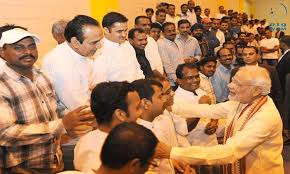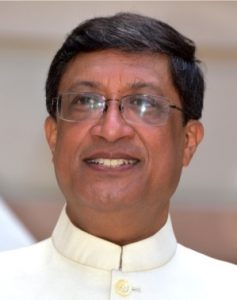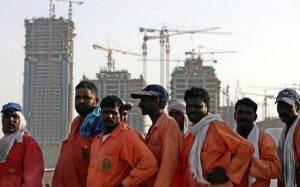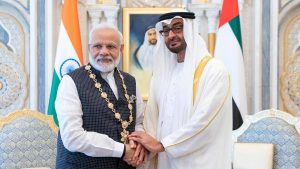
Amid inexorable disruption triggered by the coronavirus pandemic, India has forged a new paradigm of safe, stable, sustainable and smart international migration to respond creatively to the unprecedented crisis with the overarching objective of addressing interests and concerns of the 13 million NRI community, in the 31 -million strong Indian diaspora.
To shape this new paradigm of migration, India’s Ministry of External Affairs (MEA) has held a series of consultations with all stakeholders to provide an environment to promote safe, legal, smart and stable migration and respond to the challenges of Covid-19.
The consultations were held through video-conferencing with a wide spectrum of stakeholders, including the Indian Centre for Migration, Recruiting Agents, think tanks, Chambers of Commerce and international organisations such as the ILO.

Indian Centre for Migration (ICM), a specialised body dealing with migration-related issues under MEA, organised a host of webinars in the last few months to bring all stakeholders on the same platform, Sanjay Bhattacharyya, Secretary (CPV and OIA), told India Writes Network and India and the World magazine. “These cumulative efforts were designed to revive international migration. We thus engaged all stakeholders to create that conducive environment. We are happy it’s borne fruit and so soon on a significant scale,” said Mr Bhattacharyya, also a former ambassador of India to Egypt and Turkey. The initiatives are aimed at dealing with the Covid-induced situation and being proactive to promote return of migrants, he stressed.

Since March this year, around 480,000 Indian workers and professionals returned to India from the six GCC countries, home to around 9 million-strong Indian community, in the wake of the pandemic crisis. Not all of them were distressed migrants; many of them returned to be with their families and for personal reasons. Of these, 50,000 have already returned to the UAE and about 1000 have returned to Qatar and Bahrain, according to MEA. The demand for Indian migrants is expected to revive significantly as the pandemic eases. Qatar is looking to employ 15,000 workers/managers in construction, sports and hospitality connected to FIFA it will be hosting in 2022.
“We found the number of jobs projected to be lost in media reports overstated. Most workers are still in the Gulf! Most returnees have been in contact with RAs and hope to return soon,” said Mr Bhattacharyya, the senior-most Indian diplomat in charge of overseas Indians and the Gulf region.
New Vistas
Going forward, the focus is on identifying new sectors and destinations which can absorb Indian workers both at home and in foreign countries. The government has identified Japan, South Korea, Eastern and Northern Europe as target countries/regions where Indian workers and professionals returning from the Gulf and looking for new opportunities can be relocated, said Mr Bhattacharyya.
The MEA has also provided a slew of Covid-related incentives to Registered Recruitment Agencies, including 50% reduction in bank guarantees, free extension of licenses till March 31, 2021 and relaxation on office space norms to alleviate the difficult economic conditions faced by RAs and facilitate their operations to help revival of international migration, even during Covid-19.
The Way Forward
The Indian government is also in the process of aligning its e-migrate platform with GCC countries to spur the return of Indian workers to these countries. In this regard, pilot projects have already been launched with Saudi Arabia and UAE. The government is already negotiating for “prior recognition of skills” with GCC countries that will enable quicker deployment and employment of Indian workers. Skill mapping and skill matching of Indian workers that is currently being undertaken by the Indian government will aid this process.
The MEA has also organized stakeholder sessions to prepare the proposed new future-oriented Emigration Management Bill, which will be presented shortly.
The pandemic has impacted remittances from the Gulf Indian workers and professionals in GCC countries, including Saudi Arabia, UAE, Kuwait, Bahrain, Jordan and Qatar. Indians working in these countries sent home around $48 billion annually. There is no precise estimate of the impact of the pandemic on remittances, but there will be a decline, which could as high as $10 billion by March next year.
The dramatic slide in oil prices and the aftereffects of the pandemic has severely disrupted the Gulf economies leading to shrinking opportunities and loss of jobs for some Indians. But the prospects of their return to their adopted home in GCC countries are bright due to enormous goodwill for India and Indians in the region. Indian workers are highly valued and appreciated in the Gulf countries. In fact, Indian workers are most sought after as compared to compared to workers from other countries such as Pakistan, Bangladesh, Sri Lanka, Nepal and the Philippines) as they are sincere, honest and hard-working. Leaders and ministers of the GCC countries have often conveyed praise for Indian workers.
Prime Minister Narendra Modi’s visit to all Gulf countries in the last few years have imparted a new momentum to India-GCC ties.

The diplomatic outreach by India to the Gulf countries during the pandemic has been sustained and intense. “Prime Minister Modi and External Affairs Minister S. Jaishankar have spoken to their counterparts from all GCC countries, sometime more than once. There is a lot of respect and goodwill for Indian workers in the region,” Anil Trigunayat, a former ambassador of India to Jordan, told India Writes Network.

Looking ahead, sectors like health, data and management are reviving, and the demand for Indian workers in construction, oil and hospitality sectors is rising in the middle of the pandemic, said Mr Bhattacharyya. The Indian government is facilitating their return proactively, he said.
Author Profile

- Manish Chand is Founder and Editor-in-Chief of India Writes Network (www.indiawrites.org) and India and World, a pioneering magazine focused on international affairs. He is CEO, Centre for Global India Insights, an India-based think tank focused on global affairs.
Latest entries
 India and the WorldFebruary 17, 2026South-by-South: Focus on people-centric solutions at India AI summit
India and the WorldFebruary 17, 2026South-by-South: Focus on people-centric solutions at India AI summit India and the WorldFebruary 7, 2026Modi hails interim India-US trade deal, Goyal says no concessions made on agriculture
India and the WorldFebruary 7, 2026Modi hails interim India-US trade deal, Goyal says no concessions made on agriculture India and the WorldFebruary 2, 2026Trump announces trade deal with India, Modi ‘delighted’
India and the WorldFebruary 2, 2026Trump announces trade deal with India, Modi ‘delighted’ India and the WorldJanuary 31, 2026Palestinian minister bats for mediatory role for India in ending Gaza conflict
India and the WorldJanuary 31, 2026Palestinian minister bats for mediatory role for India in ending Gaza conflict







